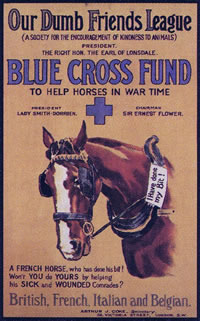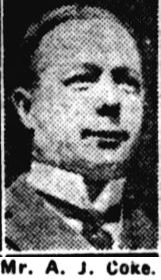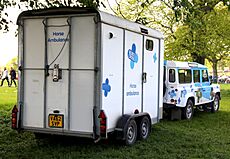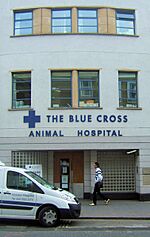Blue Cross (animal charity) facts for kids
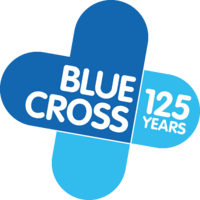 |
|
| Founded | 1897 |
|---|---|
| Focus | Animal veterinary treatment, rehoming and owner support |
| Location |
|
|
Area served
|
United Kingdom |
|
Revenue
|
£36.05 million (2020) |
|
Employees
|
779 (2020) |
|
Volunteers
|
4,327 (2018) |
Blue Cross is a well-known animal welfare charity in the United Kingdom. It was started way back in 1897 to help animals in need.
The charity gives sick or injured pets medical care, helps find new homes for them, and gives advice to pet owners. They also have a special service to help people who are sad after their pet has died. Blue Cross works with other groups to teach people how to be great pet owners and keep animals safe and happy.
Contents
The History of Blue Cross
The charity began on May 10, 1897, in London. At first, it was called Our Dumb Friends' League. Its main goal was to care for the working horses on the city's busy streets and to encourage people to be kind to all animals.
The League opened its first animal hospital in Victoria, London, on May 15, 1906. This meant that sick and injured animals had a place to get treatment, even if their owners didn't have a lot of money.
Helping Animals in Wartime
In 1912, when a war started in a part of Europe called the Balkans, the charity created the Blue Cross Fund to help care for horses caught in the conflict.
When the First World War began in 1914, the fund was started up again. By the end of the war in 1918, the Blue Cross Fund had raised a huge amount of money—almost £170,000. That would be like £6.5 million today! This money helped treat over 50,000 horses in special Blue Cross hospitals in France.
During the Second World War, the charity helped over 350,000 animals, many of whom were hurt during the bombing raids known as the Blitz.
Becoming "Blue Cross"
The Blue Cross Fund became so famous that more people knew it than the charity's official name, "Our Dumb Friends' League." So, in 1950, the charity officially changed its name to The Blue Cross. In 2011, they shortened it to just Blue Cross.
What Blue Cross Does Today
Blue Cross provides many important services across the United Kingdom to help pets and their owners.
Finding New Homes for Pets
One of the charity's biggest jobs is rehoming. They find loving new families for pets like cats, dogs, rabbits, and guinea pigs that don't have a home. They also help find new homes for larger animals, like horses. In 2015 alone, Blue Cross helped find homes for over 9,000 animals.
Providing Vet Care
Blue Cross runs four animal hospitals and several pet care clinics. These are for pet owners who can't afford the fees at regular vet offices. This ensures that all pets can get the medical care they need to stay healthy.
Education and Support
Blue Cross teaches people how to be responsible pet owners. They also have experts in animal behaviour who can help if a pet is having problems. Anyone who rehomes a pet from Blue Cross can get free behaviour advice for the rest of the pet's life.
They also run the Pet Bereavement Support Service. This is a free and private helpline for people who are grieving the loss of a beloved pet.
The Blue Cross Medal for Bravery
Blue Cross gives out special medals to animals and people who have shown amazing courage.
The first medals were given to people who rescued animals. But in 1918, medals were given to horses that had served bravely in the First World War.
Between 1940 and 1951, several dogs also received medals. One famous dog named Juliana was given a medal for putting out a fire bomb by peeing on it!
More recently, in 2006, a police dog named Jake received a medal. He helped check the London Underground for danger after the 7 July 2005 London bombings. In 2017, a Staffordshire bull terrier named Romeo was awarded a medal for being a therapy dog. He visited people recovering from strokes and also donated blood to help other sick dogs.
Working with Others
Blue Cross works with other animal charities, like the Irish Blue Cross in Ireland. It is also a member of the Animal Behaviour & Training Council, a group that makes sure animal trainers and behaviour experts are well-qualified.
 | Lonnie Johnson |
 | Granville Woods |
 | Lewis Howard Latimer |
 | James West |


